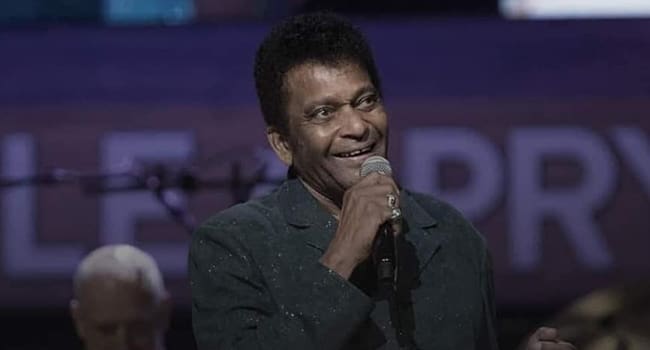 I didn’t grow up listening to country music. Nevertheless, there were country musicians I always liked. Hank Williams Sr., Johnny Cash, Willie Nelson, Charlie Daniels, Roy Clark (who was also a bluegrass legend), Kenny Rogers, Oak Ridge Boys and Alabama come to mind.
I didn’t grow up listening to country music. Nevertheless, there were country musicians I always liked. Hank Williams Sr., Johnny Cash, Willie Nelson, Charlie Daniels, Roy Clark (who was also a bluegrass legend), Kenny Rogers, Oak Ridge Boys and Alabama come to mind.
Then there was Charley Pride. He was in a class of his own.
The 86-year-old died on Dec. 12 from complications related to COVID-19. It was a tragic end to what was a remarkable life and career. He left behind an incredible musical legacy, and will always be remembered as a country and western pioneer who broke down racial barriers with talent, determination and confidence.
The fourth of 11 children born to poor black sharecroppers in Sledge, Miss., his family struggled to get by. Seeking opportunities for fame and fortune would surely have stoked his childhood imagination. It would have also been perceived as a pipe dream based on the grim realities of his life.
Nevertheless, he was destined to travel a unique path.
Pride grew up listening to blues, gospel and country. According to his official website, “His father inadvertently fostered Charley’s love of country music by tuning the family’s Philco radio to Nashville’s WSM-AM in order to catch Grand Ole Opry broadcasts.” He bought his first guitar at 14 – a “Silvertone from a Sears Roebuck catalog,” which probably cost around US$10.
Yet his early passion was to play baseball.
Jackie Robinson helped desegregate the sport starting in 1947 but there still weren’t many black players in Major League Baseball. The 18-year-old Pride played a season on the all-black Wall Lake Popcorn Kernels of the Iowa State League in 1952, then plied his trade for the Memphis Red Sox and Birmingham Barons of the Negro Leagues.
In his 1994 autobiography Pride: The Charley Pride Story, he mentioned an amusing story from his Negro League days. A new club, the Louisville Clippers, was founded in 1954. They hired Memphis Red Sox manager Goose Curry, and he took along Pride and Jesse Mitchell. Unfortunately, the team was cash strapped and couldn’t purchase a mode of transportation. Curry was forced to trade his two favourite players to Birmingham for cash to acquire a team bus. As Pride put it, “Jesse and I may have the distinction of being the only players in history to be traded for a used motor vehicle.”
Pride was a two-time Negro League all-star and tried to reach the majors. The closest he came was as a prospect for the Boise Yankees, a class C farm team of the New York Yankees. He injured his arm, was sent down to the class D team in Fond du Lac, Wis., and was later released. He toiled in Mexico, played with the Missoula Timberjacks in the Pioneer League, and had tryouts with the New York Mets and Los Angeles Angels.
It wasn’t meant to be. But something bigger was just around the corner.
Pride played country music during his baseball career. A demonstration tape ultimately made its way to legendary country musician Chet Atkins at RCA Victor, who offered him a contract. His first two singles, The Snakes Crawl at Night and Before I Met You, didn’t chart. But his third release, Just Between You and Me, hit number nine on the Hot Country Songs in 1967 and was nominated for a Grammy.
He was on his way.
Some audiences took a little while to warm up to a black country musician. He wasn’t promoted in this fashion by his record company and photos didn’t accompany his early singles. During his first large show at Detroit’s Olympia Stadium, the initial cheers turned into silence. Undeterred, Pride told them, “Friends, I realize it’s a little unique, me coming out here – with a permanent suntan – to sing country and western to you. But that’s the way it is.”
And it worked.
Pride had 30 songs reach number one on the U.S. country charts, including Is Anybody Goin’ to San Antone, (I’m So) Afraid of Losing You Again and his famous crossover single, Kiss an Angel Good Mornin’. He won three Grammys and Country Music Association awards. He was inducted into the Country Music Hall of Fame and Museum in 2000. He became the first black country musician to perform at the Grand Ole Opry since legendary blues/country star DeFord Bailey. He’s one of only three black Opry members, along with Bailey and Darius Rucker.
Pride was also RCA Victor’s second-best selling artist. Only Elvis Presley outsold him.
The love, respect and friendship of his peers was universal. Tributes came pouring in from Dolly Parton, Rucker, Marty Stuart, Keith Urban, Trisha Yearwood, Tim McGraw, Ricky Skaggs and others. They were devastated by the news and knew what an important contribution he had made to country music – and music in general.
Rest in peace, Charley Pride. May you always kiss an angel good mornin’ from now until eternity.
Michael Taube, a Troy Media syndicated columnist and political commentator, was a speechwriter for former Prime Minister Stephen Harper. He holds a master’s degree in comparative politics from the London School of Economics.
For interview requests, click here. You must be a Troy Media Marketplace media subscriber to access our Sourcebook.
The views, opinions and positions expressed by columnists and contributors are the author’s alone. They do not inherently or expressly reflect the views, opinions and/or positions of our publication.


